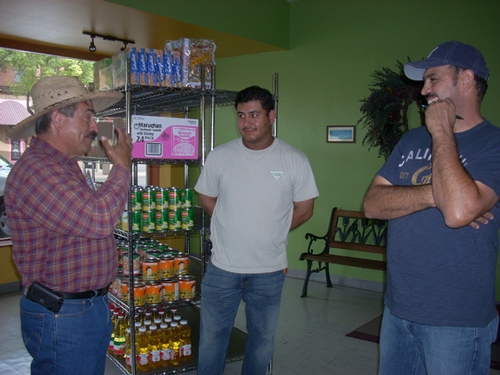
Posts Tagged: local growers
Local farms please new moms and kids
You may have noticed changes lately in some little food stores tucked into your neighborhood strip mall or main street, stores with names like "Prime Time Nutrition" or "Fiesta Nutrition." These stores are now offering enticing displays of fresh fruits and vegetables along with the infant formula, breakfast cereal, eggs, cheese and other foods that have been offered to mothers, infants and children through the WIC program since 1972.

The UC Small Farm Program and Cooperative Extension advisors in three California counties are piloting a new "Farm to WIC Program" with the stores to make sure that some of the fresh produce on the shelves comes directly from small-scale local growers, helping low-income families to participate in USDA's "Know Your Farmer, Know Your Food" campaign.
The mission of the Special Supplemental Nutrition Program for Women, Infants, and Children (WIC) is to safeguard the health of low-income women, infants and children up to age 5 who are at nutrition risk. The program provides nutritional education and vouchers for supplemental foods to qualifying families. By 2002 almost half of the infants and about one quarter of children ages 1 to 4 in the country participated. The vouchers can be redeemed at most large grocery stores, but many WIC participants prefer to shop with their vouchers at the small, privately-owned WIC-only stores that have sprung up since 2000, carrying only WIC foods and catering primarily to WIC participants.
In October 2009, the WIC program began including vouchers for fresh fruits and vegetables in the monthly allotment to all participating families. This addition meant that all WIC-authorized retailers had to begin offering a variety of fresh fruits and vegetables to their customers - no problem for traditional supermarkets, but a big change for the smaller WIC-only stores. All of a sudden they were in a new business, the produce business. The store owners now have to understand their customers' fresh produce preferences as well as safe handling of perishable products that don't arrive in the store with "sell-by" dates stamped on them.
With funding from the California Department of Food and Agriculture's Specialty Crops Block Grant program, a team of UC Cooperative Extension specialists and advisors are partnering with WIC-only stores to ease this transition.
The nutrition advisor team, led by UCCE specialist Lucia Kaiser, first conducted a survey of WIC participants at WIC clinics in Alameda, Tulare and Riverside counties to determine what crops the women would like to purchase and what qualities were most important to them in deciding what to buy. Using this information, farm advisors in each county, led by UC Small Farm Program director Shermain Hardesty, introduced local growers who could supply the selected crops in season to WIC-only store owners at stores popular with WIC participants. Soon, staff in the stores will participate in post-harvest handling training sessions led by UCCE specialist Marita Cantwell and will each receive colorful posters and handouts to help their customers select, prepare and store the fresh produce.
Lessons learned from this UC pilot project will help connect local small-scale fruit and vegetable growers with WIC retailers and keep the best local fruits and vegetables available to WIC families throughout California.

